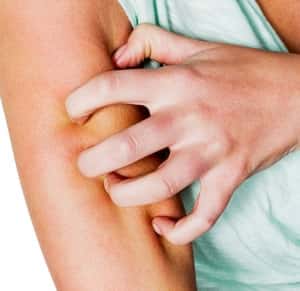
We first heard about the Zyrtec itch over eight years ago. A reader reported horrible itching within three days of stopping Zyrtec (cetirizine is the generic name for this antihistamine). He reported that the Zyrtec itch was so bad he was preparing to go to the hospital. When he restarted Zyrtec, the itching magically disappeared. Here is a link to that original story along with hundreds of comments from other visitors to this web site.
We notified the FDA. We got no response. Just a few weeks ago we contacted one of the highest executives at the agency to again report that stopping cetirizine suddenly could trigger the Zyrtec itch. We were told we would be contacted by the person in charge of such matters. So far, we have heard nada from that person.
The Zyrtec Itch May Appear When the Drug Is Stopped Suddenly:
Q. I have been taking Zyrtec for several years on a daily basis. Any time I go more than three days without it, I start to itch like crazy!
I found several articles on your website with people complaining of the same thing. My question is: how do you stop taking it? What is the best way to manage the withdrawal from it?
A. Hundreds of readers have written to us about this problem. Stopping either cetirizine (Zyrtec) or levocetirizine (Xyzal) suddenly may trigger unbearable itching that could last for some weeks. If you can stand the itching, it should ease up eventually.
A medical report on this phenomenon recommends gradual dose reduction or a short course of corticosteroids such as prednisolone to ease the itching during withdrawal (Drug Safety Case Reports, Dec. 2016).
Ideally, people would be alerted to this potential problem before they started such antihistamines, so the itching wouldn’t come as a surprise.
Other Stories from Readers:
We are fairly certain that many people can take Zyrtec and Xyzal without problems. These individuals probably experience no withdrawal symptoms upon stopping the drugs suddenly. The trouble is that we have not found large, well-controlled studies to confirm our hypothesis. We would like to know if this is a rare occurrence or fairly common. As far as we can tell, the FDA has not required the manufacturers to carry out such tests.
Here are just a few more stories from readers:
Nikki in Tennessee reports the Zyrtec itch on stopping the drug:
“I am itching to death! I tried to come off this medication a few months ago with no luck. I had severe withdrawal from stopping the medicine cold turkey.
“I went back on the drug until till last Sunday. I stopped, but slowly. I’m having new symptoms daily. I started taking Zyrtec again but, I’m beginning to itch all over. My skin is crawling. I’m burning up from the inside. I have a red rash all over my chest. It feels like bugs are crawling all over me. I have red itchy eyes, sneezing, watery eyes. You name it, I have it right now! I refuse to take it ever again, even if I itch myself to death!”
J.D.B. in New Zealand reported an itch with a different brand of cetirizine:
“I have been on my hay fever medicine for a few years now but they recently ran out. I was too busy to get more.
“Lo and behold the itching started. It’s only been 3.5 days and I’m ready to rip my skin off! Dya think it could be the med? I take Zetop.”
Upon doing some checking we discovered that Zetop is a form of cetirizine.
Josh in Kansas City, MO, adds his perspective:
“I have tried to stop taking cetirizine for over a year. I went to my allergist and asked if cetirizine could be the issue. He said it has to be something else. He told me to take cetirizine every night and Claritin every morning until my hives and itching were gone for 3 months. Then he said I could try again to stop taking it.
“What dumb advice. I did this for 2 months and then tried to stop taking it again. After one day I started getting hives again.
“This is not something I had prior to taking cetirizine. I had seasonal allergies. If I had known I could become dependent on this drug and have horrible hives all over my body as well as itching on the bottoms of my feet, I would never had taken a single pill.
“I have been off of it for eight days. During that time I have only been able to get relief with Benadryl. I am also taking a Quercetin blend and don’t know if they are helping at all. I hope this gets out of my system soon. I have never had itching this bad on the bottoms of my feet.”
Here is the original article from May 5, 2010:
https://www.peoplespharmacy.com/articles/itching-from-cetirizine-withdrawal
You will find many other posts if you search this web site for Zyrtec and itch.
Share your own story in the comment section below. If you have not experienced itching upon stopping cetirizine (Zyrtec) or levocetirizine (Xyzal), please share your story below as well.

